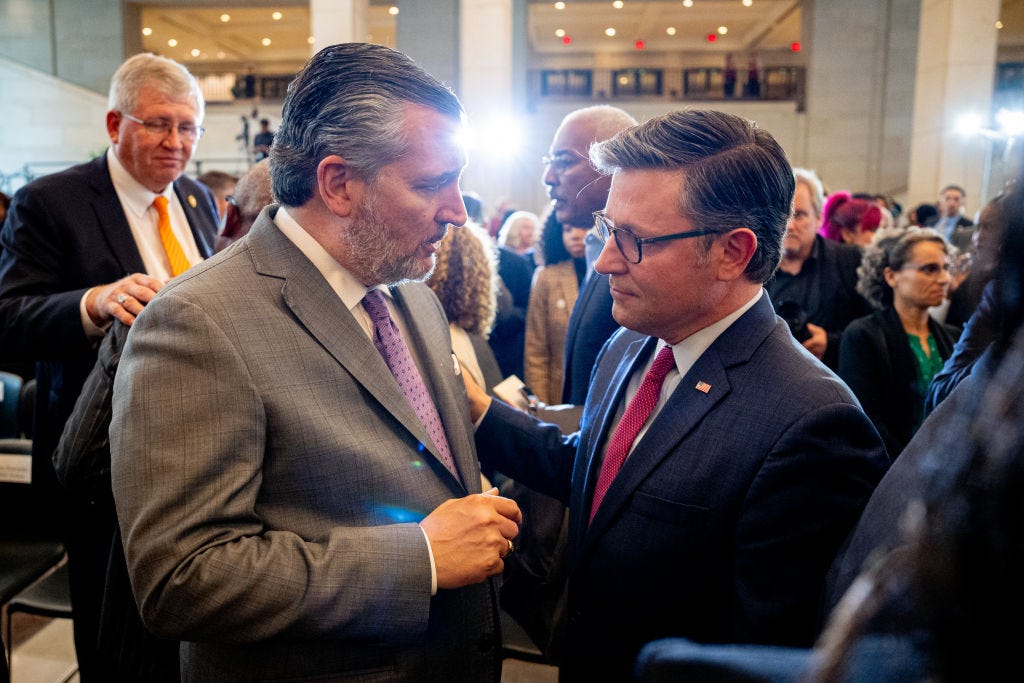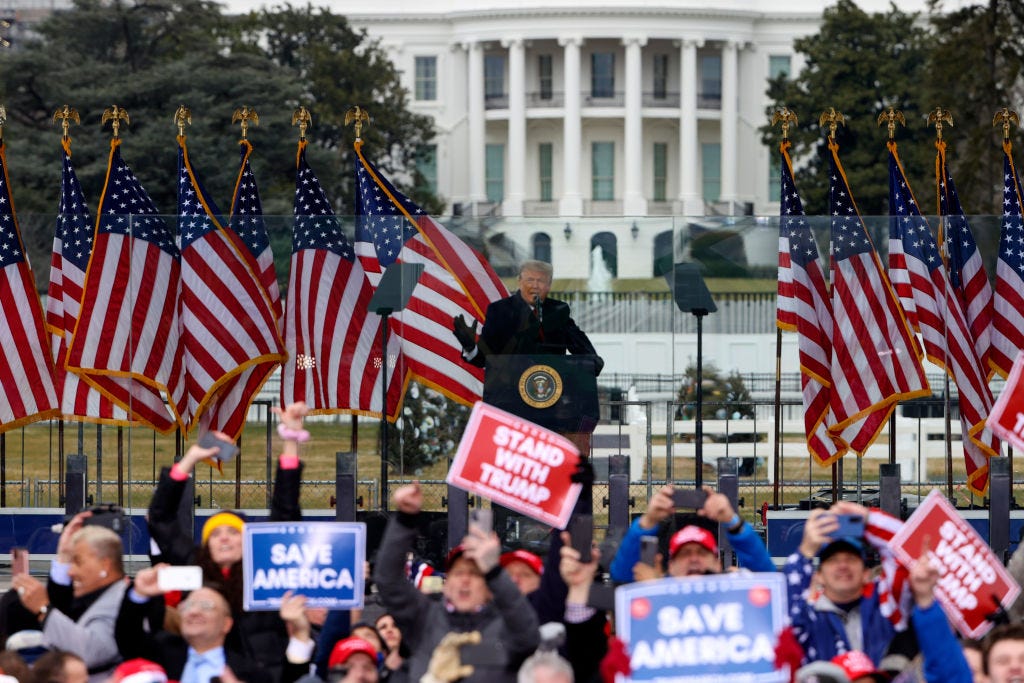157 Election Deniers Remain in Congress Four Years After Jan. 6 Insurrection
Trump’s return to the White House with an enduring number of loyalists in Congress underscores just how politically trivial the ‘election denier’ label has become.

Four years after supporters of Donald Trump stormed the US Capitol in a deadly effort to overturn Joe Biden's electoral victory, Trump remains largely unscathed. He is set to return to the White House in just two short weeks with an enduring number of loyalists who sought to keep him from leaving in the first place: 157 members of the new 119th Congress are election deniers.
While 172 members from the previous Congress were election deniers, the slim dropdown to 157 underscores how politically trivial the label has come to be.
This year’s Congress includes 137 members in the House and 20 in the Senate who fomented doubt or actively sought to overturn the 2020 election, per ElectionDeniers.org, a project of the nonpartisan pro-democracy organization States United Action. In other words, more than 38% of the Senate Republican caucus and over 62% of the House GOP caucus helped spread lies about the 2020 election results. The list includes the likes of Sens. Ted Cruz and Rick Scott, and the entire Republican House leadership (Mike Johnson, Steve Scalise, Tom Emmer, Lisa McClain, and Kevin Hern).
Outside of Washington, 10 of 27 Republican governors are election deniers, along with nine of 28 Republican attorneys general and four of 26 GOP secretaries of state. In essence, Republicans have hardly paid a price and have not retreated from what could have been a scarlet letter. All told, 23 of 51 Republican nominees for statewide office last year were election deniers. Such figures starkly contrast to the consequences of recent attempts to interrupt democracy elsewhere.
Lessons from Brazil and South Korea
Take South Korea, for example, where, just weeks ago, President Yoon Suk Yeol declared martial law on haphazard grounds that opposition members were pro-North Korea. Hours later, the opposition, along with members of Yoon’s own party, voted 190-0 to overturn the order.
Less than two weeks later, the National Assembly successfully voted 204-85 to impeach Yoon, who has since been suspended from his presidential powers. The assembly then impeached Yoon’s successor, on the basis that he was obstructing the appointment of judges to fill vacancies on the court overseeing Yoon’s impeachment; the subsequent successor quickly moved to fill the vacancies. Yoon defied a warrant issued by a South Korean court for his arrest.
Such decisive action was seen too in Brazil, after it faced its own Jan. 6-esque riots, as supporters of Jair Bolsonaro stormed the country’s National Congress and Supreme Court buildings on Jan. 8, 2023, after he lost re-election.
In the immediate aftermath, Brazil’s Federal Police arrested the Bolsonaro minister in charge of public security at the time of the attack, and just months later, the Supreme Court barred Bolsonaro from running for office until 2030. Bolsonaro and his allies have since been indicted over the alleged coup attempt (they deny wrongdoing).
A Slow, Bottom-Up Approach
In the US, efforts to hold Trump and his allies accountable, in some respects, pale in comparison. Less than a week after the Capitol riot, newcomer Rep. Cori Bush introduced her first bill that would have required the House ethics committee to investigate whether members of Congress violated their oath of office by seeking to overturn the election and, consequently, whether those members should be removed from office. The bill had 47 co-sponsors, a number that grew to 54.
The bill remained in legislative limbo, apparently not a priority for then-House Speaker Nancy Pelosi, or Tennessee Rep. Steve Cohen, who chaired the committee the bill was last left in.
Outside of Congress, efforts for accountability have not fared particularly well.
While South Korean and Brazilian officials responded decisively and immediately, Attorney General Merrick Garland, who was tasked with leading the Justice Department's investigation into the Jan. 6 attack, has attracted criticism and scrutiny for taking a bottom-up approach in focusing first on individual rioters rather than the officials fomenting the riot and in operating in a slow, conservative approach in order to appear “apolitical.”
As the Washington Post revealed in bombshell reporting, the approach ran deep; top Justice Department and FBI officials, including Director Christopher Wray, quashed efforts to directly investigate Trump’s orbit for connections to the riot, instead opting for the wary, bottom-up approach. The resistance to opening things up to Trump’s circle lasted for more than a year.

The cautious, methodical approach did eventually result in charges against him, for mishandling classified documents and undertaking a scheme to overturn the election. But they were dropped by the special prosecutor after Trump won a second term. Though over 900 individuals have been convicted in connection to the riots over the course of four years, Trump has vowed to pardon them. And while it is unclear how the Supreme Court’s ruling granting wide presidential immunity may apply to Trump, it underscores a lack of pressure on US institutions to hold him accountable for anything.
Besides the absence of legal ramifications against Trump or many of his political allies who appeared to have sowed the seeds for Jan. 6, there are political consequences. Contrary to Garland’s belief, one cannot take politics out of politics. In his attempts to do just that, he helped bring about a political atmosphere that lacked urgency for response. The overly scrupulous tip-toeing bore not results, but empty space. A vacuum for any alleged wrongdoing to not simply be normalized, but assimilated into America’s political culture. As just another feature of daily US politics.
And that’s how you get 157 election deniers in Congress, four years later.
Check out more from Zeteo:






We have had generations of mostly stable government without the experiences of authoritarian rule, unlike South Korea and Brazil. We have become spoiled and complacent.
It's just sad. How will history judge this time.